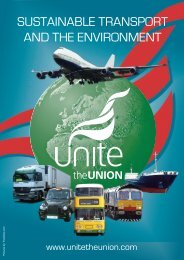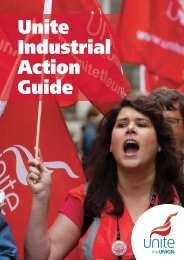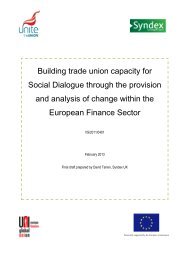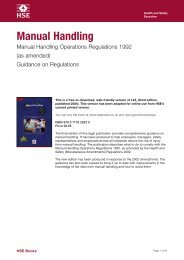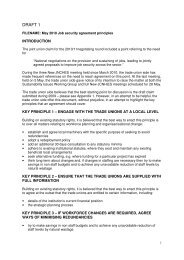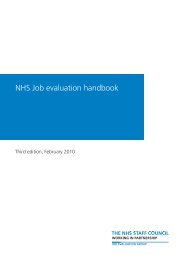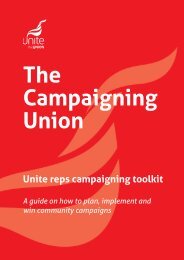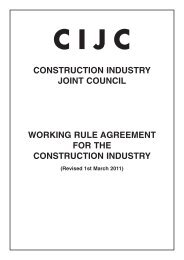Making Companies Safe - what works? (CCA ... - Unite the Union
Making Companies Safe - what works? (CCA ... - Unite the Union
Making Companies Safe - what works? (CCA ... - Unite the Union
Create successful ePaper yourself
Turn your PDF publications into a flip-book with our unique Google optimized e-Paper software.
systematic management of health, safety and environmental risks, 66 indicated that IC worked<br />
well for <strong>the</strong> Norwegian offshore oil industry, case studies of IC in o<strong>the</strong>r sectors (newspaper,<br />
sawmills, steel, and local communities) reported disappointing results. 67 Similarly, research<br />
shows that larger firms have made more progress in implementing IC than smaller firms. 68<br />
One reason why <strong>the</strong> adoption of SMSs tends to be confined to larger firms in<br />
techonologically-advanced sectors may be to do with <strong>the</strong> fact that <strong>the</strong> implementation and<br />
auditing costs of such systems may be prohibitive for smaller firms. 69 Ano<strong>the</strong>r reason that has<br />
been advanced is that <strong>the</strong> intrinsic motivation to control risks in high risk sectors will be<br />
greater, due to <strong>the</strong> fact catastrophic events may have significant economic, regulatory and<br />
public relations consequences. 70<br />
However, while some studies report that <strong>the</strong> introduction of IC in <strong>the</strong> Norwegian offshore oil<br />
industry was associated with a reduction in injuries 71 and while Norway’s offshore oil industry<br />
is generally offered as evidence of <strong>the</strong> potential benefits to be gained from a systems-based<br />
approach, 72 research on <strong>the</strong> impacts of <strong>the</strong> safety case regime 73 in <strong>the</strong> <strong>Unite</strong>d Kingdom’s<br />
off-shore oil industry indicates that, at best, it has been associated with no improvement. In<br />
addition concerns have been expressed in <strong>the</strong> context of <strong>the</strong> UK’s offshore oil industry about<br />
internal reward and punishment programs – similar to those introduced by US companies<br />
participating in VPP-type schemes – which put pressure on workers and contracting<br />
companies not to report lost time injuries. 74 In view of <strong>the</strong>se and o<strong>the</strong>r cross-national<br />
differences Frick et al. have hypo<strong>the</strong>sised that:<br />
“<strong>the</strong> contextual setting – <strong>the</strong> OHS infrastructure – may be more important in<br />
explaining <strong>the</strong> outcomes of OHS strategy than its precise procedures and tools.” 75<br />
In o<strong>the</strong>r words, differences between countries with respect to <strong>the</strong>ir political, economic,<br />
regulatory and industrial relations contexts may explain <strong>the</strong>se divergent findings. Exploring <strong>the</strong><br />
nature of <strong>the</strong>se differences can help us to identify those factors that are associated with, and<br />
seem to have influenced, positive outcomes within individual sectors and organisations.<br />
3. The importance of cross-national differences and <strong>the</strong> wider political economy<br />
Studies of <strong>the</strong> progress that companies had made in implementing Internal Control in Norway<br />
showed that one year after mandatory regulations were introduced, 66 per cent of<br />
firms has not even prepared for <strong>the</strong> introduction of IC. SMEs had proved a particular<br />
problem. Gunningham and Johnstone claim that <strong>the</strong> results for those companies that<br />
had implemented internal control were much more encouraging, with over 50 per cent<br />
completing assessments, implementing measures making action plans, and reviewing and<br />
revising <strong>the</strong>ir IC systems. 76 However, it should also be noted that after reviewing <strong>the</strong> available<br />
evidence on IC in <strong>the</strong> seven years following <strong>the</strong> regulation’s introduction, Gaupset concluded<br />
that while about half of Norwegian enterprises had adopted IC, many employers were failing<br />
to translate formal procedures into actual action. 77<br />
It appears <strong>the</strong>refore that IC in Norway has been a qualified success, although little research<br />
on <strong>the</strong> impact of IC on actual health and safety outcomes has been undertaken beyond <strong>the</strong><br />
progress observed in Norways’s offshore oil industry (see below). However, Saksvik and<br />
Quinlan warn that: “caution is required in extrapolating <strong>the</strong> experience of a country like<br />
Norway to o<strong>the</strong>rs” 78 since <strong>the</strong> political, regulatory and industrial relations contexts in Norway<br />
are distinct from those found in o<strong>the</strong>r countries – and particularly <strong>the</strong> UK. A number of<br />
commentators ascribe <strong>the</strong> country’s relative success to <strong>the</strong> fact that Norway also has one<br />
of <strong>the</strong> most stringent labour laws in <strong>the</strong> world in <strong>the</strong> form of <strong>the</strong> Work Environment Act, and<br />
to <strong>the</strong> fact that Norwegian industrial relations have been characterised by a tradition of<br />
co-operation, by high trade union membership density and complete collective bargaining<br />
rights. These, in turn, support <strong>the</strong> existence of strong and effective workplace OHS<br />
committees and worker safety representatives. 79<br />
90<br />
In view of <strong>the</strong> overwhelming evidence that workforce participation has a positive and<br />
measurable impact on OHS outcomes (see chapter 3), perhaps <strong>the</strong> most significant differences<br />
between Norway and countries like <strong>the</strong> <strong>Unite</strong>d Kingdom, Australia and <strong>the</strong> <strong>Unite</strong>d States are<br />
first, that trade union membership has been declining in <strong>the</strong> UK, Australia and <strong>the</strong> US, and<br />
second that “<strong>the</strong> Norwegian framework is more conducive to worker involvement”. 80 For<br />
instance, Saksvik and Quinlan note that:




